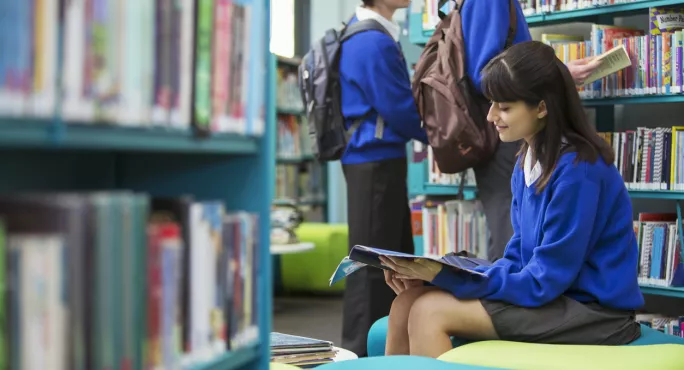Revealed: How Ofsted wants secondary heads to boost reading

The teaching of reading should continue in secondary schools so students can keep up in all subjects, according to an Ofsted best practice report.
In its new report, “Now the whole school is reading”: supporting struggling readers in secondary school, the watchdog suggests secondary schools should provide “additional teaching” in reading to ensure that all students become “proficient readers and can keep up with all their other curriculum subjects”.
Commenting on the report, Ofsted chief inspector Amanda Spielman said: “The ability to read is a fundamental life skill” but “secondary school leaders and teaching staff should be aware that a significant number of their pupils are lacking the basics”.
- Literacy: Why early reading lessons need to go beyond phonics
- Inspections: Ofsted under pressure to share inspection aides with all schools
- Ofsted: Small primary schools five times more likely to be “inadequate”
Ms Spielman said it was “essential” that pupils who leave primary schools “unable to read well” have “additional teaching” so they can “participate both academically and in wider society”.
The new study from Ofsted involved, in the spring of this year, visiting six schools where results showed a higher-than-expected proportion of students who joined as poor readers achieved a pass in English language at GCSE.
Earlier this year the government’s Levelling Up White Paper set out its ambition for 90 per cent of pupils to be meeting the expected standard in key stage 2 reading, writing and maths by 2030.
But analysis by FFT Education Datalab found that just 1 per cent of schools currently achieve this ambition.
Ofsted’s findings on reading levels in secondary school
Here are five other findings from the Ofsted report:
1. Poor readers find it ‘harder to access the curriculum’
The study aimed to investigate how schools can help all students become “proficient readers and keep up with all their other curriculum subjects”.
Ofsted said it was “harder” for students with “poor reading” to “access the curriculum in secondary school, because the required levels of literacy rise rapidly beyond primary school”.
In the six schools where the most progress was made between the end of key stage 2 and key stage 4, the study found that “the additional teaching for struggling readers” was helping students “to access the full curriculum”.
In these schools investigated by Ofsted, the watchdog said the additional support for certain students “was part of a wider whole-school strategy to improve the reading of all pupils”.
2. Successful schools ‘prioritised reading’
Ofsted’s study revealed that in the six schools visited by the watchdog, senior leaders “prioritised reading” by investing in ”additional, bespoke help for struggling readers”.
This also meant prioritising training for staff who taught reading.
Staff that received this additional training were able to support other staff members, sharing expertise and delivering “internal training”.
3. Extra support boosts ‘confidence and motivation’
The study also found that students’ confidence was boosted as a result of improved reading.
“When staff spoke about the impact of what their school was doing to help struggling readers, they frequently spoke about pupils’ confidence and motivation,” the report says.
This also meant students were “more willing to read aloud in class” in some instances, with fewer mistakes being made.
Teachers in one of the six schools observed that “struggling readers could see they were improving, and this gave them the confidence and motivation to read more”.
4. Schools should collect evidence of the impact of additional reading support
Ofsted said the schools visited as part of the study used assessments to monitor the impact of the reading support given to students.
This meant schools could “make changes when something did not help pupils to catch up quickly”.
And by “using evidence from classrooms” alongside “data from interventions”, schools were able to gather evidence on ”how specialised reading programmes and additional teaching were having an impact in the classroom”.
Ofsted said this was “important” because it allowed schools to see what was “effective”.
5. Schools should identify ‘specific reading gaps’
The research found that it was “important” for secondary school leaders to “commit time and resources to meet the complexities and challenges of making sure that all pupils become proficient readers”.
In the six schools studied by Ofsted, the watchdog observed that leaders ”prioritised early screening” of students, “followed by diagnostic assessment where needed”.
Such an approach allowed leaders to provide targeted help to students.
The research also found that leaders should “commit time and resources to meet the complexities and challenges” of helping all students to become “proficient readers”.
In the schools where additional support was provided, teachers and support staff were aware of which pupils were struggling and the interventions they were receiving.
Staff could then use this information in lesson planning, which “helped staff to create a consistent approach to teaching struggling readers”.
You need a Tes subscription to read this article
Subscribe now to read this article and get other subscriber-only content:
- Unlimited access to all Tes magazine content
- Exclusive subscriber-only stories
- Award-winning email newsletters
Already a subscriber? Log in
You need a subscription to read this article
Subscribe now to read this article and get other subscriber-only content, including:
- Unlimited access to all Tes magazine content
- Exclusive subscriber-only stories
- Award-winning email newsletters
topics in this article



